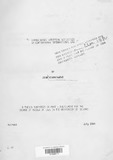| dc.description.abstract | States take decisions in the conduct of their international relations on the basis of intelligence they possess about those States they are dealing with. Not all intelligence required for taking national decisions is always readily available. Nations, therefore, have to deploy intelligence gathering activities to realize the required intelligence. Int~11igence gathering activities have, there¬fore, become an important aspect of international interaction. Between States, individuals and corporations, the intelligence industry has become one of the biggest employers. This thesis is addressed to the problems posed by intelligence gathering activities between States in contemporary International Law.
That contemporary scholarship has not been adequately directed at this area of international interaction, despite its importance, is illustrated in Chapter one.
Chapter Two traces the development of the International Law relating to intelligence gathering f r om the earliest times to the present Jay. It is adequately illstrated that International La\<J in different ages has risen to the occasion and provided nor-us to govern the prevalent forms of intelligence gathering.
Contemporary International Law recognizes various activities which are deployed by States in gathering i nt e l l i qence . In time of armed confl i ct s , States use espi onage, ordi nary treason, war treason and reconnaissance. In times of peace, they deploy peacetime espion¬age and peacetime reconnaissance, but international and State practice show no evi dence of the exi stence of peacet i me treason based on the activity of intelligence gathering activities. The similarities and differences of these activities are treated in Chapter Three.
Among the international lawyers who have dealt with the subject of intelligence gathering activities, a debate has raged as to whether these activities are permitted or prohibited by International Law. In Chapter Four, this debate is resolved i n favour of the proposition that International Law permits these activities. The Law of War and Armed Conflicts expressly permits these activities. The Law of Peace, on the other hand, has no prohibition against these activities. In the absence of such a prohibition, it is submitted that International Law permits them.
In Chapter Four and Five, it is clearly put forward and illustrated that International Law, while permitting these activities, does not prevent States from punishing intelligence gathering agents who fall into their power. The Law of Armed Conflict expressly permits punishment while municipal law in peace always provides
punishment for such agents. Only reconnaissance agents in times of armed conflicts may not be punished for their activities. If intelligence gathering agents are punished for their activities, then it is not because of the criminal character of these activities. Punishment is based on the State' 5 inherent need to preserve itself.
A survey of the protection International Law offers to particip¬ants in intelligence gathering activities is conducted in Chapter Five. In the Laws of Armed Conflicts, these persons are beneficiaries of the protection offered by International Humanitarian Law. Both procedural and substantive safeguards are offered to all participants in intelligence gathering activities. War traitors and spies who are members of the armed forces in addition enjoy immunity for their pre¬vious acts once they have completed them and returned to the armed forces to which they belong. In peace, participants in these activit¬i es are protected by the I nternat i ona 1 Law of Human Rights wh i ch ensures both procedural and substantive safeguards to all human beings. In addition, States, in order to ensure the safety of their agents sometimes cover them with diplomatic immunity. How diplomatic tmmurri ty has been used as a protect i on for i nte 11 i gence act i vi ties is discussed in Chapter Five as well. In both armed conflicts and peace, some protections are common to both phenomena. The Law of Extradition provides such protection to both wartime and peacetime reconnaissance agents. Extra-legal protective measures are also relied on by States punishment for such agents. Only reconnaissance agents in times of armed conflicts may not be punished for their activities. If intelligence gathering agents are punished for their activities, then it is not because of the criminal character of these activities. Punishment is based on the State' 5 inherent need to preserve itself. A survey of the protection International Law offers to particip¬ants in intelligence gathering activities is conducted in Chapter Five. In the Laws of Armed Conflicts, these persons are beneficiaries of the protection offered by International Humanitarian Law. Both procedural and substantive safeguards are offered to all participants in intelligence gathering activities. War traitors and spies who are members of the armed forces in addition enjoy immunity for their pre¬vious acts once they have completed them and returned to the armed forces to which they belong. In peace, participants in these activit¬i es are protected by the I nternat i ona 1 Law of Human Rights wh i ch ensures both procedural and substantive safeguards to all human beings. In addition, States, in order to ensure the safety of their agents sometimes cover them with diplomatic immunity. How diplomatic tmmurri ty has been used as a protect i on for i nte 11 i gence act i vi ties is discussed in Chapter Five as well. In both armed conflicts and peace, some protections are common to both phenomena. The Law of Extradition provides such protection to both wartime and peacetime reconnaissance agents. Extra-legal protective measures are also relied on by States | en |

